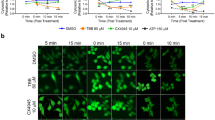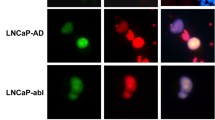Abstract
We have previously demonstrated that protein kinase CK2 is a potent suppressor of apoptosis in cells subjected to diverse mediators of apoptosis. The process of apoptosis involves a complex series of molecules localized in various cellular compartments. Among the various proteins that modulate apoptotic activity are inhibitors of apoptosis proteins (IAPs) which are elevated in cancers and have been proposed to block caspase activity. We have examined the impact of CK2 signal on these proteins in prostate cancer cells. Cellular IAPs demonstrate distinct localization and responsiveness to altered CK2 expression or activity in the cytoplasmic and nuclear matrix fractions. Modulation of cellular CK2 by various approaches impacts on cellular IAPs such that inhibition or downregulation of CK2 results in reduction in these proteins. Further, IAPs are also reduced when cells are treated with sub-optimal concentrations of chemical inhibitors of CK2 combined with low or sub-optimal levels of apoptosis-inducing agents (such as etoposide) suggesting that downregulation of CK2 sensitizes cells to induction of apoptosis which may be related to attenuation of IAPs. Decreased IAP protein levels in response to apoptotic agents such as TNFα or TRAIL were potently blocked upon forced overexpression of CK2 in cells. Together, our results suggest that one of the modes of CK2-mediated modulation of apoptotic activity is via its impact on cellular IAPs.





Similar content being viewed by others
Abbreviations
- CK2:
-
Acronym for the former name casein kinase II
- CK2α:
-
CK2 catalytic subunit α
- CK2β:
-
CK2 regulatory subunit β
- IAPs:
-
Inhibitor of apoptosis proteins such as cIAP1, cIAP2, XIAP, survivin
- TBB:
-
4,5,6,7-Tetrabromobenzotriazole
- MNA:
-
1,8-Dihydroxy-4-nitro-anthracene-9,10-dione
- TRAIL:
-
Tumor necrosis factor-related apoptosis inducing ligand
- TNFα:
-
Tumor necrosis factor α
- FBS:
-
Fetal bovine serum
References
Tawfic S, Yu S, Wang H, Faust R, Davis A, Ahmed K (2001) Protein kinase CK2 signal in neoplasia. Histol Histopathol 16:573–582
Ahmed K, Gerber DA, Cochet C (2002) Joining the cell survival squad: an emerging role for protein kinase CK2. Trends Cell Biol 12:226–230. doi:10.1016/S0962-8924(02)02279-1
Guerra B, Issinger O-G (1999) Protein kinase CK2 and its role in cellular proliferation, development and pathology. Electrophoresis 20:391–408. doi:10.1002/(SICI)1522-2683(19990201)20:2 ≤ 391::AID-ELPS391 ≥ 3.0.CO;2-N
Pinna LA (2002) Protein kinase CK2: a challenge to canons. J Cell Sci 115:3873–3878. doi:10.1242/jcs.00074
Duncan JS, Litchfield DW (2008) Too much of a good thing: the role of protein kinase CK2 in tumorigenesis and prospects for therapeutic inhibition of CK2. Biochim Biophys Acta 1784:33–47
Guo C, Yu S, Davis AT, Green JE, Ahmed K (2001) A potential role of nuclear matrix-associated protein kinase CK2 in protection against drug-induced apoptosis in cancer cells. J Biol Chem 276:5992–5999. doi:10.1074/jbc.M004862200
Evan GI, Vousden KH (2001) Proliferation, cell cycle, and apoptosis in cancer. Nature 411:342–348. doi:10.1038/35077213
Wang G, Ahmad KA, Ahmed K (2005) Modulation of receptor mediated apoptosis by CK2. Mol Cell Biochem 274:201–205. doi:10.1007/s11010-005-2952-0
Wang G, Ahmad KA, Ahmed K (2006) Role of CK2 in regulation of tumor necrosis factor-related apoptosis inducing ligand-induced apoptosis in prostate cancer cells. Cancer Res 66:2242–2249. doi:10.1158/0008-5472.CAN-05-2772
Unger GM, Davis AT, Slaton JW, Ahmed K (2004) Protein kinase CK2 as regulator of cell survival: implications for cancer therapy. Curr Cancer Drug Targets 4(1):77–84. doi:10.2174/1568009043481687
Izeradjene K, Douglas L, Delaney A, Houghton JA (2005) Casein kinase II (CK2) enhances death-inducing signaling complex (DISC) activity in TRAIL-induced apoptosis in human colon carcinoma cell lines. Oncogene 24:2050–2058. doi:10.1038/sj.onc.1208397
Wang G, Unger G, Ahmad KA, Slaton JW, Ahmed K (2005) Downregulation of CK2 induces apoptosis in cancer cells—a potential approach to cancer therapy. Mol Cell Biochem 274:77–84. doi:10.1007/s11010-005-3077-1
Ahmad KA, Wang G, Ahmed K (2006) Intracellular hydrogen peroxide production is an upstream event in apoptosis induced by down-regulation of casein kinase 2 in prostate cancer cells. Mol Cancer Res 4:331–338. doi:10.1158/1541-7786.MCR-06-0073
Reed JC (2002) Apoptosis-based therapies. Nat Rev Drug Discov 2:111–121. doi:10.1038/nrd726
Altieri DC (2008) Survivin, cancer networks and pathway-directed drug discovery. Nat Rev Cancer 8:61–70. doi:10.1038/nrc2293
McEleny KR, Watson RWG, Coffey RNT, O’Neill AJ, Fitzpatrick JM (2002) Inhibitors of apoptosis proteins in prostate cancer cell lines. Prostate 51:133–140. doi:10.1002/pros.10061
Krajewska M, Krajewski S, Banares S, Huang X, Turner B, Bubendorf L et al (2003) Elevated expression of inhibitor of apoptosis proteins in prostate cancer. Clin Cancer Res 9:4914–4925
Bortner CD, Cidlowski JA (2002) Cellular mechanisms for the repression of apoptosis. Annu Rev Pharmacol Toxicol 42:259–281. doi:10.1146/annurev.pharmtox.42.083101.143836
Ahmad KA, Harris NH, Johnson AD, Lindvall HNC, Wang G, Ahmed K (2007) Protein kinase CK2 modulates apoptosis induced by resveratrol and epigallocatechin-3-gallate in prostate cancer cells. Mol Cancer Ther 6:1006–1012. doi:10.1158/1535-7163.MCT-06-0491
Stauber RH, Mann W, Knauer SK (2007) Nuclear and cytoplasmic survivin: molecular mechanism, prognostic, and therapeutic potential. Cancer Res 67:5999–6002. doi:10.1158/0008-5472.CAN-07-0494
Kyprianou N, Bruckheimer EM, Guo Y (2000) Cell proliferation and apoptosis in prostate cancer: significance in disease progression and therapy. Histol Histopathol 15:1211–1223
Sun X-M, MacFarlane M, Zhuang J, Wolf BB, Green DR, Cohen GM (1999) Distinct caspase cascades are initiated in receptor-mediated and chemical-induced apoptosis. J Biol Chem 274:5053–5060. doi:10.1074/jbc.274.8.5053
Wang H, Davis A, Yu S, Ahmed K (2001) Response of cancer cells to molecular interruption of the CK2 signal. Mol Cell Biochem 227:167–174. doi:10.1023/A:1013112908734
Yu S, Wang H, Davis A, Ahmed K (2001) Consequences of CK2 signaling to the nuclear matrix. Mol Cell Biochem 227(1/2):67–71. doi:10.1023/A:1013156721938
Wang G, Ahmad KA, Unger G, Slaton JW, Ahmed K (2006) CK2 signaling in androgen-dependent and -independent prostate cancer. J Cell Biochem 99:382–391. doi:10.1002/jcb.20847
Davis AT, Wang H, Zhang P, Ahmed K (2002) Heat shock mediated modulation of protein kinase CK2 in the nuclear matrix. J Cell Biochem 85:583–591. doi:10.1002/jcb.10158
Yamane K, Kinsella TJ (2005) CK2 inhibits apoptosis and changes its cellular localization following ionizing radiation. Cancer Res 65:4362–4367. doi:10.1158/0008-5472.CAN-04-3941
Ahmad KA, Wang G, Slaton J, Unger G, Ahmed K (2005) Targeting CK2 for cancer therapy. Anticancer Drugs 16:1037–1044. doi:10.1097/00001813-200511000-00001
Tapia JC, Torres VA, Rodriguez DA, Leyton L, Quest AFG (2006) Casein kinase 2 (CK2) increases survivin expression via enhanced β-catenin-T cell factor/lymphoid enhancer binding factor-dependent transcription. Proc Natl Acad Sci USA 103:15079–15084. doi:10.1073/pnas.0606845103
Götz C, Bachmann C, Montenarh M (2007) Inhibition of protein kinase CK2 leads to a modulation of androgen-receptor dependent transcription in prostate cancer cells. Prostate 67:125–134. doi:10.1002/pros.20471
Fornaro M, Plescia J, Chheang S, Tallini G, Zhou Y-M, King M et al (2003) Fibronectin protects prostate cancer cells from tumor necrosis factor-α-induced apoptosis via the Akt/survivin pathway. J Biol Chem 278:50402–50411. doi:10.1074/jbc.M307627200
Di Maira G, Salvi M, Arrigoni G, Marin O, Sarno S, Brustolon F et al (2005) Protein kinase CK2 phosphorylates and upregulates Akt/PKB. Cell Death Differ 12:668–677. doi:10.1038/sj.cdd.4401604
Dan HC, Sun M, Kaneko S, Feldman RI, Nicosia SV, Wang HG et al (2004) Akt phosphorylation and stabilization of X-linked inhibitor of apoptosis protein (XIAP). J Biol Chem 279:5405–5412. doi:10.1074/jbc.M312044200
Pando MP, Verma IM (2000) Signal-dependent and–independent degradation of free and NF-κB-bound IκBα. J Biol Chem 275:21278–21286. doi:10.1074/jbc.M002532200
Wang D, Westerheide SD, Hanson JS, Baldwin AS Jr (2000) Tumor necrosis factor α-induced phosphorylation of Rel/p65 on Ser529 is controlled by casein kinase II. J Biol Chem 275:32592–32597. doi:10.1074/jbc.M001358200
Romieu-Mourez R, Landesman-Bollag E, Seldin DC, Traish AM, Mercurio F, Sonenshein GE (2001) Roles of IKK kinase and protein kinase CK2 in activation of NF-κB in breast cancer. Cancer Res 61:3810–3818
Seldin DC, Landesman-Bollag E, Farrago M, Currier N, Lou D, Dominquez I (2005) CK2 as a positive regulator of Wnt signaling and tumorigenesis. Mol Cell Biochem 274:2532–2538. doi:10.1007/s11010-005-3078-0
Desagher S, Osen-Sand A, Montessuit S, Magnenat E, Vilbois F, Hochmann A et al (2001) Phosphorylation of Bid by casein kinase 1 and 2 regulates its cleavage by caspase 8. Mol Cell 8:601–611. doi:10.1016/S1097-2765(01)00335-5
Krippner-Heidenreich A, Talanian RV, Sekul R, Kraft R, Thole H, Ottleben H et al (2001) Targeting of the transcription factor Max during apoptosis: phosphorylation-regulated cleavage by caspase-5 at an unusual glutamic acid residue in position P1. Biochem J 358:705–715. doi:10.1042/0264-6021:3580705
Olsen BB, Jesson V, Hojrup P, Issinger O-G, Boldyreff B (2003) Protein kinase CK2 phosphorylates the Fas-associated factor Faf1 in vivo and influences its transport into the nucleus. FEBS Lett 546:218–222. doi:10.1016/S0014-5793(03)00575-1
Li PF, Li J, Muller EC, Otto A, Dietz R, von Horsdorf R (2002) Phosphorylation by protein kinase CK2: a signaling switch for the caspase-inhibiting protein ARC. Mol Cell 10:247–258. doi:10.1016/S1097-2765(02)00600-7
Ahmad KA, Wang G, Unger G, Slaton J, Ahmed K (2008) Protein kinase CK2—a key suppressor of apoptosis. Adv Enzyme Regul 48 (in press). doi:10.1016/j.advenzreg.2008.04.002
Acknowledgments
This work is supported in part by funds from USPHS Research Grant CA-15062 awarded by the National Cancer Institute, Department of Health and Human Services, and in part by the Medical Research Fund of the U.S. Department of Veterans Affairs. We deeply appreciate the critical comments of Dr. J. Trembley during preparation of the manuscript.
Author information
Authors and Affiliations
Corresponding author
Rights and permissions
About this article
Cite this article
Wang, G., Ahmad, K.A., Harris, N.H. et al. Impact of protein kinase CK2 on inhibitor of apoptosis proteins in prostate cancer cells. Mol Cell Biochem 316, 91–97 (2008). https://doi.org/10.1007/s11010-008-9810-9
Received:
Accepted:
Published:
Issue Date:
DOI: https://doi.org/10.1007/s11010-008-9810-9




